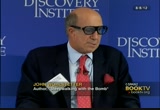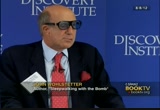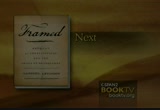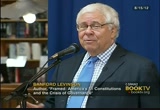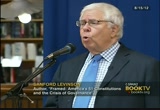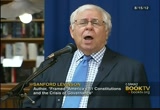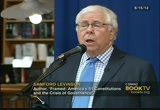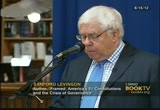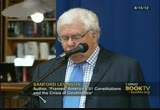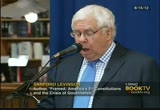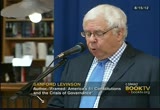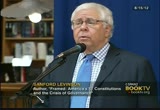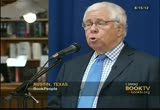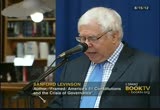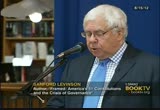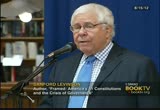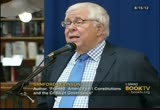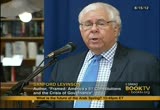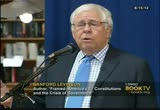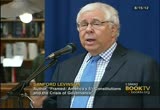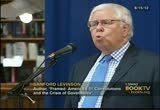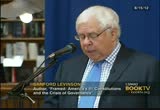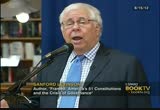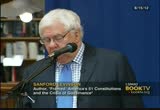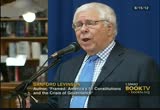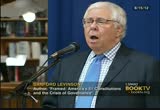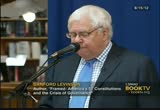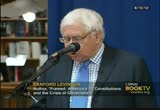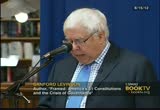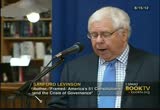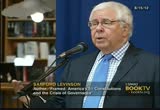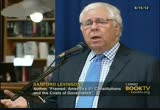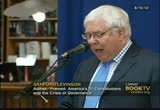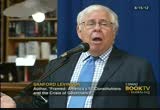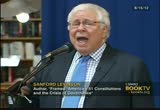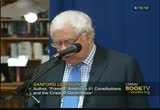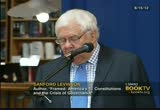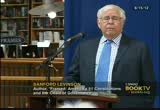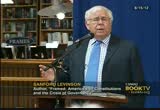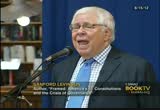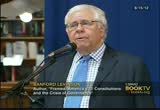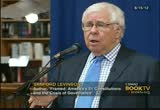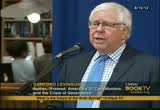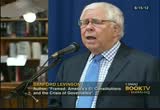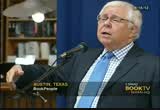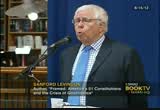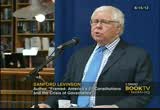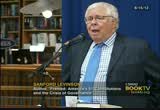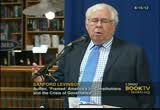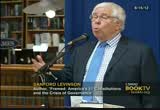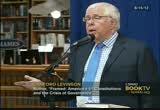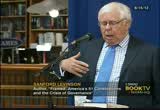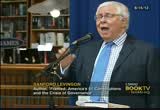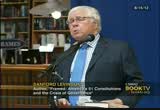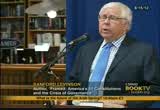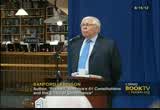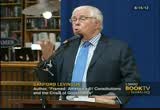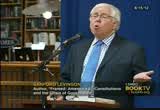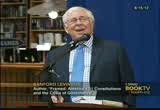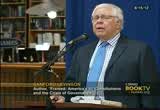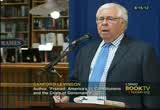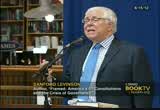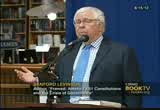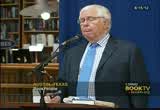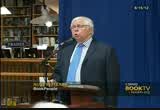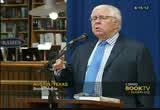tv Book TV CSPAN September 29, 2012 9:00am-10:15am EDT
9:00 am
in a generation opportunity to bring this down. now perhaps we'll get another chance if assad falls. it could help reenergized the green movement. it would be a huge defeat for iran and also for russia and hezbollah. and that is the ultimate solution. in the meantime you certainly deployed every weapon you have come and cyber is one of them. we are a lot better at it than they are. quickly in terms of cyber. you think of three kinds of broadly speaking, look at cyberattacks. one is you try to use it to take on that works. whether it's a communications network, for example, shut down your communicate shouldn't, financial network or something. the other key ways depend on the networks working. one is to use your communications network to launch an attack against another network idea electrical grid. so use it as a launching point. and a third is to use it for content, and this is where the
9:01 am
islamists have considerable confidence in radicalizing people over the internet with radical oriented islamic content. so we have an edge in the first two areas. we have us and the israelis. the most skilled people elsewhere on this, probably the governments behind russia and china are very good at that stuff. and that will come into any confrontation we have with them. content, they are more skilled at using than we are but we should certainly use whatever weapons we can. >> thank you, john. let's give john wohlstetter i hand. [applause] ..
9:02 am
whenever it is you are watching i appreciate that. always told by my wife and daughter after presenting some earlier remarks, i should make it much shorter which i will try to do. my hope is to talk for about 15, no longer than 20 minutes and reserve a lot of time for the questions and commentss and counterarguments that not only do eyes the suspect some of you have but i know given some people in this room i know
9:03 am
without a shadow of a doubt i welcome. this is, we are told, the most important election in our lifetime and it may be that more people believe that this year than believe in 2008-2004-2004 another election where that is regularly said. for this to be true, among other things elections must have genuine consequences for the making of public policy particularly with regard to domestic policy. we could have separate conversation about the issue of presidential power with regard to foreign policy, military policy but let me say my primary interest in the book and my remarks this evening is more domestic policy and the extent
9:04 am
to which elections do or do not bring us close to resolving important issues of domestic public policy. for the older members of this audience there have been at least one election that did fundamentally change america and that is 1954. a mere 48 years ago, when all of the stars were aligned and not only to create a landslide victory for president lyndon johnson, richard nixon got a landslide victory in 1972, but a landslide democratic majority in the house and senate and let us not forget a supreme court of the united states that was still fairly and the control of
9:05 am
liberal democrats. 4 two brief shining years or perhaps baleful years if you don't like the great society but for two years for better or for worse the united states had a government in the way that we often seek of her majesty, having a government that is a group of people who can implement a party platform that can be judged at the next election or serious elections. that is not generally the way the united states operates. courtesy of the constitution drafted in 1787 and what i want to in sister relatively unamended thereafter with regard to the basic structures we live under. the republican president,
9:06 am
president johnson, nixon, ford, reagan and george h. w. bush not for a single day had even a single house of congress from their own political party. ronald reagan did have the senate for four years but he never had a full congress that was republican. bill clinton did have a full congress that was republican but bill clinton was democrat. and you have fragmented government, george w. bush had a republican congress for four to eight years. george bush scarcely had the best domestic legislative accomplishment that could rival lyndon johnson or to be fair richard nixon. perhaps the 2012 elections will generate a unified government that will pass its preferred programs but it would be
9:07 am
foolhardy, most observers at this time is the more or less maintenance of the status quo in which barack obama will continue to occupy the oval office as the republicans continue to patrol by reversed number of the house of representatives with the senate at this time being up for grabs. so we should be open for the possibility that the current election will fit the shakespearean description of sound and fury signifying nothing or very little with regard to domestic policy and that is what i am focusing on. perhaps not nothing. considered the conclusion of tom friedman's column on april 22nd of this past year in which he
9:08 am
expressed great concern that i certainly share about the health of our political system. he began by asking what some leaders found no doubt inflammatory, quote, does america need and arabs spring. his answer is basically yes, quote, we can't be great as long as we remain a of the talks with the rather than a democracy. our deformed political system with a congress that has become a form for legalized bribery is truly holding us back. ave talk receipt allows what some would regard special interest to prevent the passage of legislation both supported by majorities of the electorate and
9:09 am
in fact perhaps conducive to some coherent notion of the national interest. i began my prior book, where the constitution goes wrong and how we the people can correct it by detailing my reasons for refusing to sign the squirrel at the national constitution center in philadelphia that invites visitors to emulate those delegates who did sign the constitution instead of the three great holdouts who did not. i might interpolate that i visited the national constitution center in this past may she took a picture of me with the three hold outs, edmund randolph. many of the reasons for my own holding out in 2003 at the opening of the national
9:10 am
constitution center as suggested by the democratic constitution related to the fact the united states constitution is in many ways remarkably undemocratic. not only when compared to almost any constitution written elsewhere around the world since the end of world war ii but also when compared to the 50 other constitutions in america. the full title of my book, "framed: america's 51 constitutions and the crisis over governance," and one of the things that has become a hobby of mine and will be the brunt of a course in the fall in harvard law school is every student particularly at our so-called elite was schools which would
9:11 am
lead students graduates to believe there's only one constitution in the entire united states to realize federal defaults that each stage has the constitution and one discovers contrary to the bad recruit at stake constitutions have, and remarkably interesting. and without exception more democratic than the united states constitution. there's a controversy among political scientists about the degree to which the united states constitution is continuing to serve as a model, what i find much more telling is the united states constitution, a remarkable and relatively non examined degree did not serve as a model for the state constitutions that were drafted
9:12 am
in this country beginning around the turn of the nineteenth century. if you look at various new york constitutions and other constitutions you find dramatic differences. the new york constitution of 1846 for better or worse and when talking about constitutional design one always has to say for better or worse but it is the new york constitution that led the way to a judiciary, something we in texas are intimately familiar with but returning to united states constitution for the moment my argument is 1787 constitution established a set of institutions that worked systematically not only to minimize the practical importance of elections by
9:13 am
making it difficult to pass any national legislation precisely because of constructing a byzantine system of checks and balances, constitute the vito a vitocra vitocracy. we have a try cameral legislature in the united states senate is true in 49 of 50 states. finance and buyer of nebraska which has shown it is capable to achieve a decent political order withi am and buyer of nebraska h has shown it is capable to achieve a decent political order with only one legislative house. we have our house of representatives and senate--a
9:14 am
single president who with a stroke of a pen can render irrelevant the joint decisions made by both house and senate perhaps with significant majority in each but not the magic and relatively unattainable number of two thirds required to override a presidential veto. we also remember this year that even getting through a try cameral legislature might not be enough because we currently live under an extraordinarily politically divided supreme court that certainly believes itself authorized to strike down legislation. some people would say to serve as a fourth legislative chamber. the united states under both democratic and republican presidents declares its support for what i have come to call of democracy project around the world.
9:15 am
we should reflect far more than we do on the fact that the united states at least so far as the national government is concerned scarcely meets the 20 first century criteria of democratic rule. this is why friedman could seriously suggest that the united states might need its own springtime of democracy. that being said i have also concluded that most americans don't care about democracy either at home or abroad. a number of people came up to me after the earlier book, end reminded me, some gently and some not so, that didn't i realize that we weren't intended to be democracy. we are a republican and we should keep it that way.
9:16 am
the people who said precisely that i am sure did not know they were repeating to a slogan of the john birch society but i can testify from personal experience that it is heavily wired in to the american political mind that there's something dangerous about democracy which is instantly identified with tyranny of the majority and that we should embrace and venerate institutions that make it next to impossible for majorities to govern on less all the stars are aligned in just the right way as they were between 1964, and 1966. the fact that i am critical of the united states constitution for being democratic may mean only the i am too academic in
9:17 am
the pejorative sense in my approach to the constitution and insufficiently appreciative of the benefits. barack obama is the candidate in 2008. said of the constitution it has worked pretty well for 200 years. among others things the complaisant assurance by the first african-american president requires overlooking a brutal civil war that lasted four years and killed 750,000 people. a war that i am sure many of you experience as having occurred between semesters, when the first semester of american history that you might have taken concluded in 1860 and picked up again perhaps in 1868 or 1877.
9:18 am
this is the way american constitutional law is tops. it appears by magic in constitutional courses with literally almost no time spent on how we got either the thirteenth or the fourteenth amendment which is much closer to chairman mao's notion that howard including constitutional power grows out of the barrel of a gun than it could be understood simply in the model of the 1787 constitution that would suggest any amendments would come through a nice, calm and peaceful article 5 process where we deliberate on what would make us better and two thirds of congress says that is right and three quarters of the state legislatures say we are with this program too.
9:19 am
the suggested we not describe how we got reconstruction amendments. i've like to think candidate obama was engaging in opportunistic rhetoric given that almost literally the last thing he could forge to be perceived as either then or today was as a critic of our foundational text. his opponent, governor romney assuming he takes mormon theology seriously does in fact treat the constitution as a sacred foundational text. that is what the book of mormon says. forget the fact that the constitution is woefully in nondemocratic. perhaps that truly doesn't matter. the new book begins and certainly friedman's and my
9:20 am
focus is on the degree to which people are fundamentally dissatisfied or worse with the current operation of the american system of government. how many of you agree with a 61% of polled americans that the country is going wrong direction for the political system is proving inadequate to engage in necessary terms? whatever your own major concerns might be? were you a drought-stricken farmers you would i suspect the furious beyond belief at the irresponsibility of the present congress taking an election campaign recess instead of tending to those national priorities. some persons tie the drought to
9:21 am
human cause global warming. one sees a totally non responsive congress. if one is more of a political right and i would insist that my book independently of my political views is not written as a left-wing tracked because it seems very clear the tea party for example is justifiably outraged at the inability of the system to respond to a number of its issues. that if legitimately regards as important. including a careening national debt and the inability of congress seemingly generally to get any control of ever increasing medical expenses that could bankrupt the national economy if something doesn't get
9:22 am
done. i am glad obamacare passed. i am glad the supreme court upheld it but almost nobody believes it provides a genuine solution to the very genuine problem of the deficiencies with regard to costs. the contemporary united states government in its basic constitution's structure with any genuine affection. averaging polls in the last three weeks reveal only 17% of americans approve of congress. 76.5% disapprove. this actually represents a slight uptick of approval given in september of 2011 the new york times published an article in the personal approval of
9:23 am
congress matches record low of 12% just as the gallup poll organization reported in the same month that, quote, american express historic negativity towards u.s. government, quote, knowing 81% of those polled were quote -- quote, dissatisfied with the way the country was being governed the. most shocking was august 2011 poll finding that 17% of those surveyed said the present national government actually possesses the consent of the governed. americans are currently remarkably distrustful of their basic institutions including for that matter in an unprecedented way the united states supreme court which been most recent polls has the approval of fewer than 50% of the american people.
9:24 am
usually the supreme court is significantly higher than the so-called political branches but for better or worse more and more americans view the supreme court as just another political branch and don't like that much of what they say. one exception to mistrust is the american military which has the relatively strong confidence of 78% of the public and the confidence of 94% of the public if one simply adds some confidence to those with strong confidence. this is one reason why if president obama does win in november which i expect him to do i would make a bet that the president inaugurated in january of 2017 will be general david
9:25 am
petraeus because he will be the person in whom americans will have any confidence at all whether or not it is merited which is a subject for another presentation. i wonder altogether seriously if so few americans had we been able to hold them in 1776 would have expressed approval of more confidence in the british parliament of king george iii. there were after all lots of loyalists. that is where canada basically comes from. expressions about the does functionality or even pathology of the american political system has become a staple of contemporary punditry. even standard and poor's when downgrading american debt from aaa to aa status last year
9:26 am
wrote, quote, the downgrade reflects our view for the effectiveness and predictability, and political institutions. non going fiscal and economic challenges. they did not say the american economy is collapsing and did not warrant to trust investors. rather what they said was the american political system is collapsing and in so far as the health of the american economic system does depend on cogent decisions made by the american political system, and investors should lose some of the confidence they might have had. what is missing from the analyses of friedman and others
9:27 am
is an ability to connect the dots between our institutions and the constitution that created them. we are treated to constant criticism of our leaders. both of those who currently in have a public office and those who wish to. and perhaps their unwillingness to compromise with one another. what we do not adequately emphasize is that there may be nothing at all irrational about bear behavior given the incentives created by the constitutional system as drafted in 1787 under assumptions of what the political water would look like 1787 that were fundamentally shown to be wrong no later than 1800. but we have not in fact
9:28 am
addressed since then. my a few for example is the late senator ted kennedy bears a genuine responsibility for electing george w. bush in 2004. for a very simple reason. it is kennedy who made possible the passage of george w. bush's signature domestic achievement, no child left behind and the prescription drug law. i really don't care what you think of either of those laws. what we do know is president bush was able to run in 2004 not only as the leader of the war on terrorism but also a republican who could in fact work with democrats to pass what was described as significant
9:29 am
domestic legislation that addresses problems with education and medical care. mitch mcconnell, leader of the senate republican party, has told us repeatedly that his primary priority was defeating barack obama in 2012. it is readily understandable why he does not wish to emulate senator kennedy and thus enable obama's reelection. one could easily say newt gingrich made a mighty contribution to reelecting bill clinton. in 1996 by giving him a welfare bill that he was surprised to discover that clinton would sign. it may be the weakness of the candidacy would have doomed to regardless but in many ways the election was over. that kennedy embrace so-called
9:30 am
welfare reform and republican legislation that was passed. what we learned in american politics was americans fixate on the president and blame warm praise the president for what ever happens. congress gets very little credit or more to the point of a presidential candidate of the opposition congress that works well with a president gets very little credit for their good sportsmanship. what they do is to re-elect the incumbent president. one cannot blame mitch mcconnell for does siring not to re-elect a democratic president. what one can blame is the
9:31 am
flavors in 1787 and others to fail to recognize the implications of developing a basically parliamentary party structure in a system of so-called checks and balances that was designed for ruled by a virtuous public interested politicians who would not submit to the temptations of what madison called factional politics including making decisions on the basis of what will most tell pure political party rather than what will necessarily help the country. after praising friedman for his diagnosis of america's condition let me conclude by offering some severe criticism of his limitations. in friedman's recent best
9:32 am
seller, co-authored with michael mandelbaum that used to be us:how america fell behind in the world invented and now we can come back, we find the statement that quote for america's remarkable history the constitution deserves a large share of the credit. although friedman and mandel bomb called for shock therapy to alleviate what they call the, quote, apology of contemporary american politics they also write that the country does not, quote, and need fundamental changes to its central government. a system that has served it well for two centuries and approve any quote to coping with a series of major challenges. friedman is usually careful. there was not an ounce of evidence in his book for the proposition that we have been served so well.
9:33 am
maybe we have but we would like to see what the evidence is but what would be remarkable if the constitution has only served us well and never once in its 225 years had any defects. and the constitution on occasion was probably all right and may be really very good. as i say it seems to the just remarkably fanciful to say as friedman does that it has served us well and proven equal to the task of coping with major challenges unless you view the war that killed 700,000 people and was a war that was fundamentally caused by the constitution.
9:34 am
not simply in spite of the constitution that that is simply a blip that can be overlooked in this presentation of constitutional triumphalism. these benign assertions exemplify the nile that the constitution like -- friedman is incisive with rights of difficulties posed by their respective constitutions in such countries as egypt, lebanon, iraq, afghanistan or turkey. only when he turns to his own country does his acuity disappear in favor of general denunciations of our political system as if our political system has nothing to do with the constitution that gave it
9:35 am
life and preserves its fundamental forms. he concludes with acknowledgements. after mentioning many people, some of them in this room who directly contribute to the ideas and writing of a book i mention my three grandchildren. rebecca and 1-year-old sarah. none made a direct contribution to the book but all deserve recognition as a splendid people. moreover they are truly the source of my passion concerning what i call in the title the crisis of governance in contemporary america and the role played if only marginally by the 51 constitutions within the united states in making it more difficult to resolve the problems that will dominate their futures. they deserve better. all of our families and
9:36 am
strangers with whom we are connected as fellow citizens and happens in the united states not to mention strangers around the world who are affected by decisions made or not made by the united states government deserve better. many of us are at an age that quite frankly it might not really matter what happens or does not happen as a result of the next election. would such complacency be plausible with regard to our children and the children. i suspect that some of you have questions, comments, denunciations and i look forward to them. [applause] >> we do have the microphone. your questions could end up on tv. if you could stand up.
9:37 am
>> c-span -- let me express my gratitude -- if you would go to the microphone. >> stepped up to the microphone and speaking into it and they can pick up everything you say so ask the way. >> a very simple question. given your analysis with a solution. >> excellent question. on the principle that you hang for a sheet. my solution is to support calling a new constitutional convention. we haven't had one for 225 years. something the constitution does contemplate the possibility. one of the things i like some much about american state constitutions is they often welcome new conventions. there have been 225 state
9:38 am
constitutional conventions over the last 225 years. each state has had just short of an average of three constitutions. not will lead do they amend the constitution but with some frequency they actually replace them or come to the conclusion that the old constitution is no longer fitting. some of you may remember there was the texas constitutional convention in 1972 very much supported by texas political elites and it went down in public referendum has many proposals to. but i would very much like to see a serious national conversation that would be on c-span. it would become the ultimate in reality television. i mean that altogether
9:39 am
seriously. where our fellow citizens will discuss what is the state of the current political system and does it need significant changes? >> a couple points. maybe i am being too optimistic but i look at great successes in the last 40 years and policy problems. one of the biggest was the greenspan commission on social security where there is no way out and bipartisan got together and gave sufficient to do so. i would like to think when things get serious enough and debated solutions occur. in that sense the current election by turning over the rock and the tea party may well solve the problems. >> we will see. two comments with regard to things like the greenspan commission.
9:40 am
this was tried with simpson-bowles and failed spectacularly in part because of paul ryan. you are against the basic problem that if paul ryan had voted for the simpson-bowles proposal and if we had gotten through congress with president obama's support, obama would get the credit and he would be waltzing to a piece of cake reelection. i do think -- and there is the third problem. peter orszag, the head of the budget bureau wrote an op-ed in the new york times saying my own instincts, problem with the united states is too much democracy. we can't get anything done. if we actually try to do it
9:41 am
through elections and procedures what we need are ever more expert commissions that will make decisions for us. maybe that is true but it should be recognized that if that is the solution to our problem, we should stop traveling to other countries around the world that what they need is more democracy because in fact we would have come to the conclusion that democracy doesn't really work. >> i really welcome this. my understanding is the newspapers and the constitution, grew out of a lot of study of constitutions across country and so forth so that grew out of a serious study of other constitutions. what you are proposing is a constitutional convention which i find interesting and your
9:42 am
knowledge of the 51 state constitution as well as the others you are looking catch would give you perspective which would be useful in such a constitutional convention. based on everything you have seen if you could compose three things for a new constitution the most important changes, what would those be? >> let me take your word proposal literally. at the end of the they might not be all that important like getting rid of tenure for the supreme court. they should have single 18 year terms. that is small when talking about fundamental change. let me suggest proposals that i would like to see argued out on
9:43 am
c-span and incidentally let me also say another question you might have in mind -- i have an answer to that and it is based on a wonderful book by paul woodruff called first democracy which in fact returns to ancient athens and suggests we select more leaders than we do moderators. whether or not the house and senate should be selected by lottery we can debate but it seems to me it would be wonderful to select members of a convention by lottery basically nationwide and the three proposals i've like to hear discussed not necessarily in order of importance. first of all how do we adjust
9:44 am
institutions developed in 1787 under the assumption of rule by benevolent political elites who would more or less share a notion of public interest. how do we make those institutions congruent with the party structure you see in parliamentary systems across the world? my proposal would be the canadians, maybe in fact they made the better response by going ironically enough that the british went in the nineteenth century toward parliamentary government rather than stick with the separation of powers structure we have. i don't have pound the table
9:45 am
views on this, it does need to be discussed. assuming we stick with separation of power system and a bicameral system so that we have a house of representatives and a senate. i despise the current senate but not opposed to the bicameral system per se in a country this large and even a stage as large as texas probably benefits. i supported jesse ventura when he said they should emulate nebraska but we are much larger. i think bicameral is enough so that another proposal would be either to eliminate a
9:46 am
presidential veto in substantial respects or to make it far easier for congress to override presidential vetos. presidential vetoes are upheld 95% of the time. it seems to me that is too high a success rate. i don't know what the right success rate should be. i would like to hear a debate about this. in certain aspects you might strengthen the presidential veto. the texas governor for better or worse -- when talking about taxes -- texas governor has the line-item veto. for in line item veto, if you are concerned about earmarks and the like, the whole ecosystem is not just one thing but a collection of things. i would like to hear this debate
9:47 am
in. the third proposal again assuming we stick with a separation of powers is we are able to fire a president in midterm. the impeachment system has been an utter failure partly because it has been captured by warriors. we shout at one another about what constitutes a high crime or misdemeanor. i am not fond of presidents who are criminals but quite frankly i don't think that is the greatest threat to the american political system. a far greater threat is having a president in whom one has lost fundamental confidence with regard to issues of war and peace and wife and death. so even if we don't go the full parliamentary route, i would like to see a system whereby
9:48 am
congress perhaps by two thirds vote can vote no confidence in the president and require the president's replacement by somebody from the president's own party so you can't simply affect a party to and replace a republican with a democrat or democrat with a republican but at least get rid of a particular democratic president or a particular republican presidents that leaves you feeling sick in your stomach as you go to bed and as you wake up with regard to qualities of judgment. with regard to certain important issues. i have others as well. >> if we fired presidents in midterm we would get rid of
9:49 am
truman, reagan and clinton. don't know if that is a good way to approach things. i want to compliment you for putting your finger on a real problem. no question in my mind if we got together in this room, we would probably come to a reasonable agreement on gun-control, simpson-bowles, budget and the rest. it is obviously disturbing the american people and reflected by statistics. the question i have is what you heard from your first three questionnaires and that is what specifically are you going to do to change it? what would the american people agree to? one is changing the president in mid term which i am not happy with. the other is changing the veto power and what the statistics are. it seems to me you talk about
9:50 am
state constitution and i gather you studied the state constitution. my question to you is what state constitution has really worked and when you tell me the state constitution has really worked with specific amendments to the constitution do you think the american people agree on? you are absolutely right when you put your finger on the fact that the system doesn't work the way it should. >> really worked scares me a little bit. in part because it might suggest what i was criticizing friedman for doing. that a constitution will always work or it will always be us down the path toward the cliff.
9:51 am
one of the most fundamental questions is whether constitutions are important that all. many would say what is really important with regard to any political system is economy homogeneity or hetero jenne 80, how many languages are spoken, how many religions and the extent of the space and facilities among the religions, how are natural resources distributed, generally not a good idea for all the resources to be found only in one part of a large country and things like that. i don't want to overestimate the importance of constitutions or to say here is our constitution that has really worked because no doubt there would be examples when it didn't. let me be truly heretical and
9:52 am
say that one of the things i like about many state constitutions and you find these especially as we move west but not only in the west, is the degree to which they allow an element of direct democracy. the united states constitution was written by people who not to put too fine a point on it were fundamentally mistrustful to their core of democracy. james madison rights very proudly in the third federalist that although the constitution is ordained we the people, that will be the last time the people speak more or less directly. otherwise they will speak exclusively through elected representatives. if you look at a whole bunch of states there are ways of doing headlines around elected
9:53 am
representatives. many of you will be immediately think of california and many of you will say that immediately makes this a stupid suggestion because it is certainly the case that the california constitution itself helps to explain why that states is in current desperate straits. but california isn't the only state in the united states that allows direct democracy just as there are states around the world including switzerland which most people find very dull and boring country with referenda all the time. think of maine. most people don't think of maine ever. when you do think of maine you think of a dull and boring state. main has a provision in the constitution that allows the electorate to put on the ballot
9:54 am
a referendum on recently passed legislation. it is not california where the electorate's can initiate legislation and pass legislation. rather it is what might be called instead of judicial review citizen review. twice in the last three years citizen review in maine has worked to overturn legislation for better and for worse. the first time in 2009, 53% of the main electorate voted to invalidate a law passed by the legislature and signed by the governor that would have legalized same-sex marriage. i am very sorry the electorate did that. last year the main electorate's overrode a law passed again by
9:55 am
the maine legislature by the republican governor that would have considerably restricted the ability of people to vote in elections. and i was opposed to that and i was delighted when the main elector agreed. in ohio another state that is not viewed as wild and crazy there was a referendum most recently that overturned a public employee of union law that had been passed by the legislature. wisconsin has gone through a very melodramatic recall election. i actually like these sorts of things. i like the fact that the people can feel empowered to take control of their own government and make the pitch to their
9:56 am
fellow citizens. some time there pitches work and sometimes to my regret they don't work. but it is democracy in action. what we do, i think, is overgeneralize from the experience of california and then with california i return to what i was saying months ago, the pathology of california at strongly linked to their constitution or is it explicable because it is a too large states of thirty-six million people with very different economy is and different cultures and no constitution could in fact allow california to the govern effectively and the california constitution does explain some part of it. i don't believe any constitution
9:57 am
explains what is going on in its entirety. political scientists are usually thrilled if they can establish that something will explain 5% or 10% of what contributes to some phenomenon. my view is the constitution explains 5% for 10% but it is an important 5% or 10%. a metaphor i am increasingly fond of is to think interaction effects among drugs where you take aspirin and this or that and the other. usually is just fine. so long as you take them separately. the most innocent sort of drug that benefit you like aspirin can kill you in interaction with
9:58 am
other drugs. it is important to know how drugs interact. my view is the constitution under certain circumstances generates extraordinarily dangerous interaction. one of the interaction effects is to create a general -- has no say in the government and they don't really matter. if by mastering it would mean the ability of a winner to implement a program. >> follow-up. >> real concise, short answer. your basic recommendation and the american people would agree. not enough to say national discussion is confidence prevention. your specific recommendation is some initiative referendum for the constitution.
9:59 am
>> some direct democracy. the strongest possible direct democracy and there are good reasons to have second and third thoughts about the wisdom of going all the way down that road. some form of direct democracy. one other point. how do we know what the american public would in fact agree with or vote for unless you talk to them like adults and say we are in a pickle. what is truly inspirational about the framers and i always insist that i do not think engage in bashing the press will they were smart then and they were a trying to do their best and the time of genuine challenge.
10:00 am
they wrote these newspapers -- most famous of which the federalist papers and really tried to to address one another as serious adults. we don't do that. we have these thirty-second adds and the whole notion that is conveyed about the american public is we have no attention span and really cannot be addressed as serious adults. what would happen if people actually had a sense that they were being taken seriously? ..
10:01 am
10:02 am
about the so-called reserve powers. you look at constitutions that are around the world and you discover that states or provinces are given exclusive authority and what over language poor religion, education fulfil in the blank. we could debate about at great lengths, but i assume that if you would like federalism some degree of sub national economy where people can make decisions relatively free of national override that our constitution does a dreadful job well in protecting local economy. you might come on the other hand to all believe in some areas we have too much local autonomy as a political matter and would want to address that in the
10:03 am
constitution. you mentioned cities that are very interesting. texas is six times as large as the entire united states population. we in austin especially are familiar with the tyranny of the centralized government in austin itself called the state government that often seems determined to deprive the city of austin of autonomy over matters that we hold near and dear. to the extent that federalism does stand for principle of decision making at seven national levels and allowing people to participate in decisions that affect your lives , than any modern constitutional convention weather at the state or national level would have to address this
10:04 am
what kinds of protected attali to you want for states and what not. these are all wonderful subjects for convention or for any sort of natiol conversation that we are not having. >> my question is based on a lot of the things you said. i wonder what your take is on who would support the kind of things the you're talking about given the fact that you have kind of a lot of people clamoring for change with the occupy movement and the tea partier. >> very good question of very common response to my earlier book is some degree of agreement on the particular diagnosis and then after disbelief that i could be serious in proposing a national convention. i get this from my closest friends and family.
10:05 am
many others as well. short anecdotes. last september there was a fascinating today gathering at the harvard law school coach sponsored by professor when lawrence has written his own cry from the heart about the present state of american politics. he focuses on particularly campaign funding. it's co-sponsored by larry and by the patriots to party movement. we constitute one may be as much as half of all more or less respectable support. so it was interesting type of case. what i discovered is that there
10:06 am
is a remarkable mirror image between left and right on this. i dare say that almost all of my friends and family are certain that any such convention would be taken over by the two-party. then you would just set out your worst pat jennings for what they would do. what i also discovered is that the two-party is under the delusionary view that the convention will be taken over by people like me. they have their own set of fierce about what people like me will do. here is one of the reasons i like the idea. but i do think that because americans so fundamentally distressed one another and
10:07 am
believe the worst about one another that it is not simply swimming upstream but swimming up a waterfall to try to persuade people that a new national convention is not, in fact, and utterly crazy idea. >> i am sympathetic to much of what you say, but like you, i have lived through time when the separation of powers has played a really important role in protecting our system and democracy such as it is. i am also pessimistic about the prospects for the sort of constitutional convention and all, but in the short run everybody seems to feel that things are worse now in terms of effective action by congress, for example, than any less --
10:08 am
any of us can remember. and there are a lot of different ideas about why that is. maybe it is the growth of talk radio and cable television. maybe it is having a black elected president or maybe all kinds of things there are things that could be done pretty easily to improve the productivity of congress. for example, if the senate were to change its rules to limit the filibuster or at least to prevent filibusters on bringing a bill to the floor which is an innovation to the republicans basically or that fill this is actually the filibusters. today we don't have real filibuster is like remember. if you do this i'm going to filibuster or we're going to filibuster. well, if you're that of so we won't even bring something out. so things like that might really
10:09 am
make a significant contribution to improving the effectiveness of congress in the short run, don't you think? >> all i can say is possible even. i think one of the reasons why we have that kind of flow filibuster's now instead of the guild fashions strom thurmond speech is that congress doesn't do that much. it is just remarkable to see what wasn't on the congressional agenda in the late 50's's or even 60's. they didn't have to worry about national education policy, national energy policy, you know, terrorism policy. you just go down a whole litany of things that the modern
10:10 am
congress which incidentally has consisted of the same number of people as the 1959. so you have more people or the same number of people trying to do so much more than they ever did. villagers of any kind just kind of destroy the institution. but i think that's one reason why the idea of returning to the old fashion -- let me say one final thing about watergate. watergate is a tribute to the upside of politically divided government. that is, richard nixon was run out of town because the democrats controlled congress. if the republicans have controlled congress this would not have happened. one of the things you do get
10:11 am
with divided government is greater oversight of the president by the congress so that the current house of representatives is spending all of its time besides voting to repeal obamacare, trying to investigate the obama administration, and this is exactly what would be predicted. so what we have been is separation of party some, not really separation of powers. we have unified government. we don't have oversight. and what we need to address is how we get the benefit of oversight that we do get when we have divided government without paying the immense cost which is the near impossibility that we in our time now pass responsible
10:12 am
legislation. >> i just have a question. the amendment process. our constitution, some of the mark and a big like the fact that i can vote. and that i dislike the fact that i can vote, the fact that black people and no wonder considered property. i don't know if they actually even succeed to see how it's even -- it didn't really change. and the constitution, and amendment process, even a good thing we always have to look over the whole document to see how changes to be made. >> the united states constitution is the most in the known world. all of the state constitutions are easier to amend the indian state's constitution. already congested all other
10:13 am
national constitutions of which are aware. deasy to amend that the united states constitution. the flavors were not -- did not suffer from the illusions of grandeur that we often project on to them. they did not believe that they were getting it just right once and for all. article five is a testament to the fact that they thought amendments would be buckley and necessary. indeed, the convention might be desirable. article five says the convention with two-thirds of the state. to err is human. it is our fault that we have projected on to them this notion that we were demi guns and that
10:14 am
we don't adequately discussed of the imminence we have done and what took to get them. it ticket least a half century. the was movement began in 48. the 19th amendment comes along in 1920. we get the 13th and 14th and 15th amendment because of war and because the radical republicans who were able to affect successfully seized control of government, in part -- and i applaud this, by threatening to impeach andrea johnson. it will to push through changes that otherwise would not have occurred. quite frankly i have no reason to think tha
134 Views
IN COLLECTIONS
CSPAN2 Television Archive
Television Archive  Television Archive News Search Service
Television Archive News Search Service 
Uploaded by TV Archive on

 Live Music Archive
Live Music Archive Librivox Free Audio
Librivox Free Audio Metropolitan Museum
Metropolitan Museum Cleveland Museum of Art
Cleveland Museum of Art Internet Arcade
Internet Arcade Console Living Room
Console Living Room Books to Borrow
Books to Borrow Open Library
Open Library TV News
TV News Understanding 9/11
Understanding 9/11